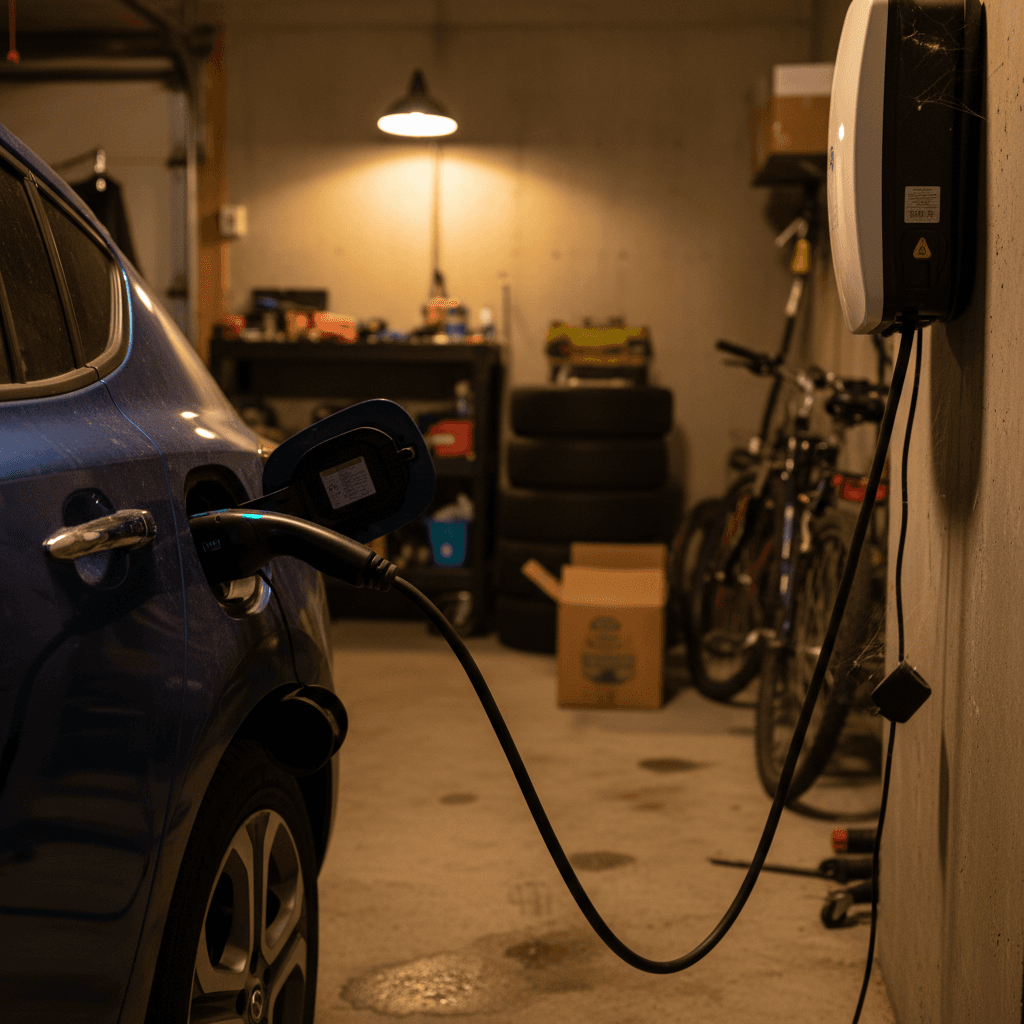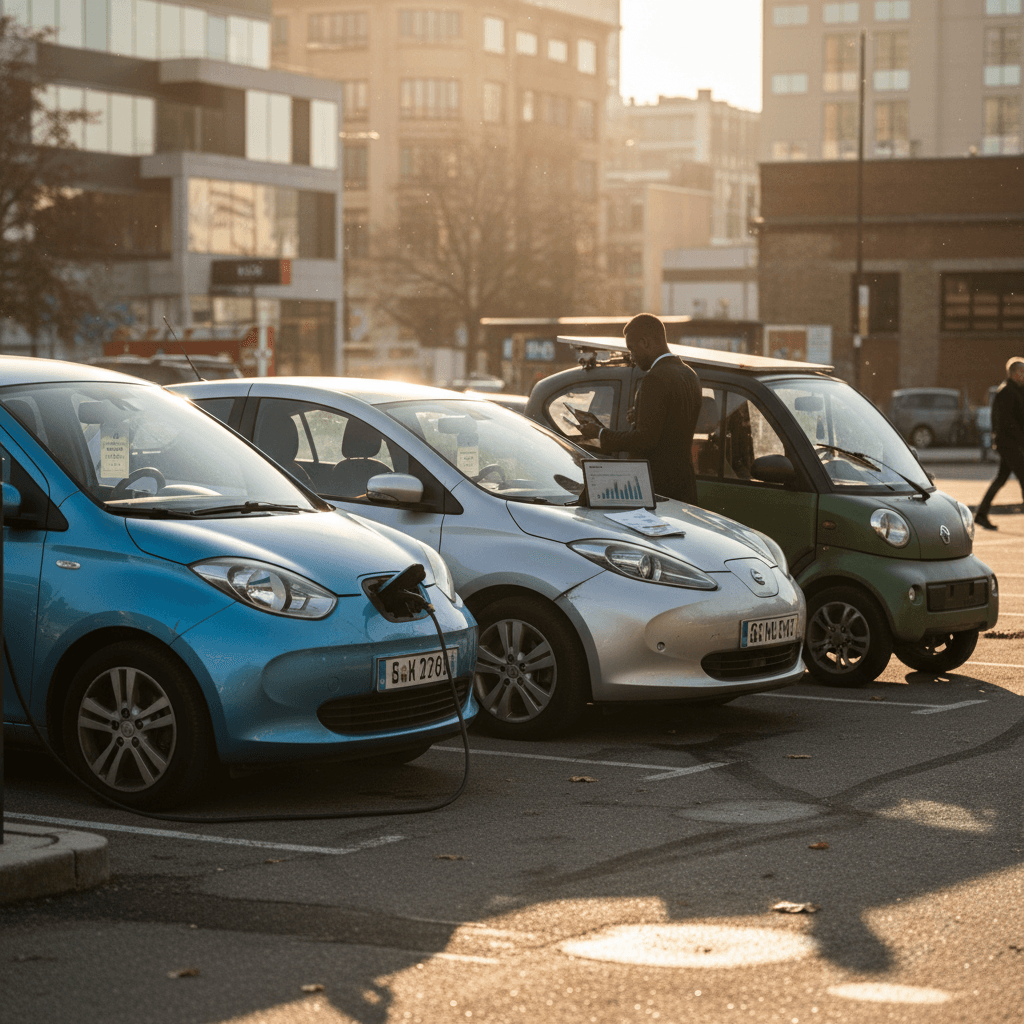If you’re staring down the same stretch of highway or stop‑and‑go city street every morning, an electric commuter car can turn that grind into something calmer, quieter, and a lot cheaper to run. The trick is choosing an EV that fits your commute, your parking situation, and your budget, without overbuying on range or features you’ll never use.
Why commuters are switching to EVs
What is an electric commuter car?
An electric commuter car is simply an EV you rely on as your daily driver for work, school, or regular errands. It doesn’t have to be tiny, bare‑bones, or slow. In practice, commuter EVs range from compact hatchbacks like the Chevrolet Bolt EV to sleek sedans like the Hyundai Ioniq 6 to small crossovers like the Tesla Model Y.
- Primary use: weekday driving to work, school, or regular errands
- Typical daily mileage: 15–60 miles round trip
- Charging pattern: mostly at home or at work, with occasional public fast charging
- Priorities: comfort, predictable range, low running costs, easy parking
Think of it this way: a good commuter EV makes Monday morning feel less like a punishment. Instant torque for merging, one‑pedal driving in traffic, pre‑heated (or cooled) seats before you even step outside, and no gas station detours.
Is an electric commuter car right for you?
Who benefits most from an electric commuter car?
Match your situation to the EV strengths
City & inner‑suburb drivers
If your daily loop is mostly surface streets under 40 mph, you’re a perfect candidate. Regenerative braking recovers energy in stop‑and‑go traffic, and smaller EVs excel at tight parking.
Highway commuters
If you rack up 40–80 highway miles a day, look for 250+ miles of rated range and a comfortable seat. Features like adaptive cruise control and lane‑centering can turn slog into cruise.
Home chargers & apartment dwellers
Access to overnight charging is the biggest unlock. A simple Level 2 charger at home or a reliable workplace charger makes even a modest‑range EV feel huge for commuting.
When an EV commuter might not fit, yet
Key features of a great commuter EV
Useful benchmarks for electric commuter cars
- Right‑sized range: Enough for your routine with 30–50% buffer, not just the biggest number on the brochure.
- Comfortable seats & quiet cabin: Small annoyances add up fast when you sit in them every weekday.
- Strong safety tech: Adaptive cruise control, lane‑keeping assist, and blind‑spot monitoring shine on commutes.
- Good efficiency: A sleek sedan like the Hyundai Ioniq 6 can post high MPGe, meaning lower energy costs.
- Simple, reliable charging setup: Ideally, Level 2 at home or at work; public DC fast charging as backup, not daily diet.
Match the car to your worst day, not your best
Best electric commuter car types
Compact hatchbacks & city cars
Compact EVs like the Chevrolet Bolt EV or Nissan Leaf shine in dense areas where parking is tight and speeds are low. You get great efficiency, low purchase prices (especially used), and easy maneuverability.
- Best for: Urban and close‑in suburbs
- Pros: Easy to park, affordable, efficient
- Cons: Less cargo space, shorter range in some trims
Sedans & small crossovers
Sleek sedans such as the Hyundai Ioniq 6 and compact crossovers like the Tesla Model Y or Kia EV6 work well for longer highway commutes and mixed‑family duty.
- Best for: Longer distances, mixed family and commute use
- Pros: More range, more space, more comfort
- Cons: Higher purchase price, slightly larger footprint

Popular electric commuter cars in 2025
You don’t need a six‑figure luxury EV to build a great commute. The sweet spot for an electric commuter car is a mainstream model with solid range, good reliability, and widely available service. Here are some of the most popular options U.S. commuters gravitate toward in 2025:
Representative electric commuter cars and what they’re good at
Specs vary by trim; focus on how each model fits different commuting styles.
| Model | Typical EPA range | Character | Best if you… |
|---|---|---|---|
| Hyundai Ioniq 6 | ~240–342 miles | Extremely efficient sedan, smooth ride, fast charging | Want a comfortable, aero‑slick highway commuter with low running costs |
| Tesla Model 3 | ~260–363 miles | Quick, tech‑forward sedan with huge fast‑charging network | Value fast charging on road trips and advanced driver assist on your commute |
| Tesla Model Y | ~303–330 miles | Small SUV with loads of cargo space and strong range | Mix kid duty, weekend trips, and a solid daily commute |
| Hyundai Ioniq 5 | ~220–303 miles | Stylish hatchback/crossover with roomy cabin | Care about design, space, and ultra‑fast charging capability |
| Kia EV6 | ~240–310 miles | Sporty, efficient crossover | Want a fun‑to‑drive commuter with plenty of range |
| Chevrolet Bolt EV (used) | ~238–259 miles | Compact, affordable hatchback | Want a budget‑friendly city commuter and don’t need a big cabin |
| Nissan Leaf (used newer gen) | Up to ~226 miles | Simple, proven runabout | Prioritize low purchase price and local driving over highway fast‑charging speeds |
Use this table to narrow your short list, then cross‑shop new and used options.
Why used commuter EVs make so much sense
New vs. used electric commuter cars
Choosing between a new or used commuter EV
Both can be smart, just for different reasons
When a new EV makes sense
- You qualify for strong federal or state incentives that effectively lower the price.
- You want the latest driver‑assistance tech and infotainment.
- Your commute is long enough that you want maximum current‑gen range.
- You plan to keep the car 8–10+ years.
When a used EV is the better commuter
- You mainly drive 20–60 miles a day and don’t need 300+ miles of range.
- You want a payment that competes with a used gas compact.
- You’re open to slightly earlier tech if the battery is in good shape.
- You’d like to let someone else eat the steepest depreciation.
Let the battery, not the model year, make the decision
What an electric commuter car really costs
EV shoppers usually focus on the sticker price. Commuters should look at total cost per mile instead: payment, insurance, electricity, and maintenance versus gas, oil changes, and repairs on a conventional car.
Fuel & maintenance savings
- Electricity vs. gas: At typical U.S. rates, many commuters pay the equivalent of $1–$1.50 per gallon when they charge at home, especially off‑peak.
- Less routine service: No oil changes, fewer moving parts, and less brake wear thanks to regenerative braking.
- Predictable costs: Most EVs include 8‑year/100,000‑mile battery warranties, which often cover the entire span of a heavy commuting phase.
Costs that can sneak up on you
- Home charging install: A Level 2 charger plus electrical work can run a few hundred to a couple thousand dollars depending on your panel and distance runs.
- Public fast‑charge pricing: Great in a pinch, but expensive if you rely on it daily.
- Insurance: Some EVs cost a bit more to insure; it’s worth getting quotes before you buy.
Run the math on your actual commute
Charging strategy for commuters
The best electric commuter car is only as good as your charging plan. Fortunately, commuting is one of the easiest use cases to cover: your driving is predictable and usually clustered in the same windows of time.
Build a stress‑free charging routine
Confirm where you’ll charge most nights
If you have a driveway or garage, a 240V Level 2 charger is the gold standard. Apartment dwellers should scout on‑site chargers, nearby public options, or workplace charging before buying.
Match range to charging access
If charging at home every night is easy, a 200–230‑mile EV may be plenty. If you only plug in every few days, aim for 250–300+ miles of range to keep things relaxed.
Use Level 1 smartly
If your commute is short (under ~25 miles/day), a regular 120V outlet can work, especially if you plug in every night. Don’t ignore this option if panel upgrades are expensive.
Limit daily DC fast charging
Fast charging is great for road trips, but using it every day can be hard on your battery and your wallet. For commuters, it should be an occasional tool, not your primary fuel source.
Schedule off‑peak charging
Most EVs let you set start times. If your utility offers lower overnight rates, schedule your car to drink cheap electrons while you sleep.

Battery health tips for high‑mileage commuters
Putting lots of miles on an EV each year isn’t a bad thing, these powertrains are built for it. But as a commuter, you do want to treat the battery kindly so it holds useful range deep into the car’s life.
- Avoid living at the extremes; keeping your daily charge window roughly between 20% and 80% is kinder to the battery than constant 0–100% swings.
- Save full 100% charges for days when you know you’ll need maximum range (like a long client visit or side trip).
- Minimize daily DC fast‑charging unless your car is specifically tuned for frequent fast use.
- Park in the shade or a garage when you can, heat is hard on lithium‑ion batteries over time.
- Stay current on software updates; some EVs get improved battery management and range over time via over‑the‑air updates.
Don’t ignore a shrinking range
How Recharged helps you find the right commuter EV
If you’re leaning toward a used electric commuter car, the hard part is separating a great daily driver from a pretty listing. That’s exactly the gap Recharged was built to close.
What you get when you shop commuter EVs with Recharged
Designed around everyday electric drivers, not just spec sheets
Verified battery health
Every vehicle on Recharged comes with a Recharged Score Report that includes advanced battery diagnostics, so you know how much real‑world commuting range to expect, not just what the original window sticker claimed.
Fair, transparent pricing
Recharged benchmarks every EV against current market data, so your commuter car payment reflects true market value. You can also get an instant offer or trade‑in estimate for your current vehicle.
EV‑specialist support & delivery
From helping you choose the right model for your exact commute to arranging nationwide delivery, Recharged’s EV specialists walk you through the entire process, fully online or with a visit to the Richmond, VA Experience Center.
Make the money part painless
Electric commuter car FAQ
Frequently asked questions about electric commuter cars
Bottom line: building your perfect electric commute
A great electric commuter car isn’t the one with the biggest battery or wildest acceleration. It’s the one that shrugs off your daily miles, slips easily into your parking spot, and quietly saves you money every month. Start by mapping your real commute, then look for an EV that covers those miles comfortably, matches your charging reality, and fits your budget, new or used.
If a used EV makes the most sense, letting Recharged handle the heavy lifting, battery diagnostics, fair pricing, financing, trade‑in, even nationwide delivery, means you can focus on the important part: how that car feels on your drive home. Get the commuter car right, and every workday gets a little easier.

